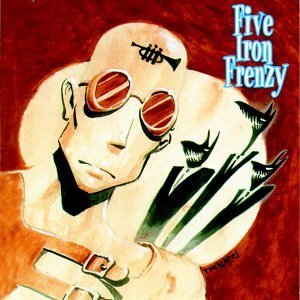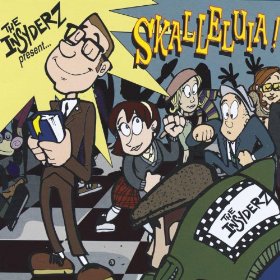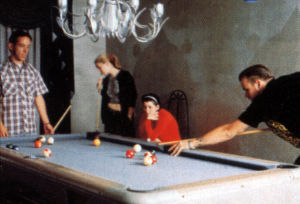
Five Iron Frenzy is an American band which formed in Denver, Colorado, in 1995. Best known for playing ska punk music characterized by an offbeat sense of humor and prominent Christian themes, Five Iron Frenzy was one of the pioneering figures of the Christian ska movement which emerged with ska's mainstream revival in the 1990s. Since 2000, the band's music has shifted away from straight ska to include and embrace stronger alternative rock and pop punk influences, though it continues to create ska music and feature Christian lyrical themes despite several members' changes in religious beliefs.
The Insyderz were an American Christian ska-punk band from Detroit, Michigan. They formed in 1996 and disbanded in 2005. The band reformed in 2009, but have not been actively playing shows in the last few years. The Insyderz are one of the "big three" bands which represented the Christian ska scene, alongside the Supertones and Five Iron Frenzy.

The Orange County Supertones were a Christian ska band from Orange County, California. The band was signed to Tooth & Nail Records and its imprint, BEC Recordings, before becoming an independent band. The band temporarily disbanded in 2005, reunited in 2010 to resume touring and recording, and permanently disbanding in 2017. The OC Supertones were one of the first widely successful Christian ska bands.

Quantity Is Job 1 is an EP by the band Five Iron Frenzy. It was released November 3, 1998, on Five Minute Walk.

Our Newest Album Ever! is the second full-length studio album released by the band Five Iron Frenzy. Its street date was November 11, 1997, on Five Minute Walk, under the SaraBellum imprint, with distribution from Warner Bros. Records.

All the Hype That Money Can Buy is the third studio album by Five Iron Frenzy, released on April 25, 2000, by Five Minute Walk, under their SaraBellum imprint, with distribution from Warner Bros. Records.

Skalleluia!, also called The Insyderz Present Skalleluia!, is the second album by the Christian third-wave ska band, The Insyderz. Released 5 May 1998, it is the first of their albums dedicated to ska renditions of worship songs. The album was an unexpected success for the band, which had been reluctant to record an album of praise and worship music despite their own background with the genre.
Sonicflood is an American contemporary worship music band from Nashville, Tennessee, that has been touted as "The Fathers of the Modern Worship Movement." The group took the name "Sonicflood", a reference to a line in the Book of Revelation, chapter 19, verse 6.

Fourth From the Last is the first album by the band The W's, released in 1998 by 5 Minute Walk. The name of the album is derived from the fact that the letter W is the fourth from the last letter in the Latin alphabet.

5 Minute Walk was an independent record label founded by Frank Tate in April 1995. Operations were based in Concord, California in the back offices of The Screem, a music club operated by Tate. They only carried Christian bands and considered themselves to be a Christian ministry. Most records were produced by Masaki Liu at Masaki's One Way Studio and executive produced by Frank Tate.
Soul-Junk is an experimental genre-hopping Christian rock and hip hop group from San Diego, California.

Never Say Dinosaur is a tribute album dedicated to Christian rock band Petra. The album includes 11 revisions and re-imaginings of classic Petra songs and one original composition by Kevin Smith of DC Talk. Dinosaur contained an eclectic lineup of artists which, at the time, highlighted "some of the best new bands in Christian music."
Squad Five-O is an American punk rock band from Savannah, Georgia no longer formally touring or recording, but rather only performing occasional weekend concerts. Like their initial ska-punk stylings, their name was derived from a cross between the television shows Hawaii Five-O and The Mod Squad. Between 1997 and 2006 the band grew lyrically and in popularity, and also shifted its style significantly. Over the course of their career they moved from a small indie Christian label to the major label Capitol Records and released five albums in the process.
Massivivid was a Christian band founded by Wally Shaw and Mark Nash. Their sound was based in industrial rock and electronic pop, but with a hard edge and intensity similar to that of Nine Inch Nails or The Smashing Pumpkins. Massivivid was founded as a live side project to Deitiphobia. They released BrightBlur to critical acclaim, garnering a Dove Award.

Morella's Forest was a band from Dayton, Ohio which formed in 1992. They released three albums on Tooth and Nail Records and one with an independent label. Their signature sound is noise pop or space music comparable to Starflyer 59 or the Breeders.

Ruby Joe was a Christian band from Ventura, California. Their debut album was cited as psychobilly, but their second played squarely as swing revival due to the appearance of the horn section of Royal Crown Revue. Both were released on Sub•Lime Records, in 1998 and 1999. The bands' name is a combination of the founder's name and that of Ruby's Diner in Huntington Beach, where the band was formed.
Rod Laver was a Christian rap rock group that originated from Los Angeles. As the personnel lineup changed, the group wavered from a rock-grounded sound to hip hop, and then back again.
Christian ska is a form of Christian alternative rock, and subgenre of ska and ska punk which is lyrically oriented toward contemporary Christian music. Though ska did not constitute a genre within the Christian music industry until after third wave ska had peaked in the general market, Christian ska continued to thrive independently into the early 2000s.
The Miscellaneous was a 1990s alternative rock band composed of members from Europe and the United States. The band was fronted by a male and a female vocalist, and produced music that is said to "transcend the boundaries" of its genre in creativity. CCM magazine likened their music to that of Sixpence None the Richer, Jars of Clay and Out of the Grey.

Engine of a Million Plots is the sixth studio album by American band Five Iron Frenzy, released independently on November 26, 2013. Released ten years after the band's previous album The End Is Near. Engine of a Million Plots marked Five Iron Frenzy's return to recording following an eight-year hiatus spanning from November 2003 to their reunion in November 2011.














